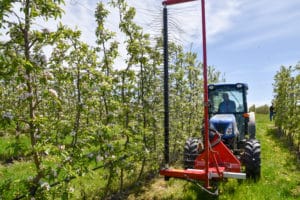Bans on the apple industry's go-to thinning chemical, carbaryl, by retailers such as Whole Foods Markets have prompted New York apple producers, CCE educators and Cornell researchers to team up to examine a mechanical blossom thinning alternative to carbaryl
This article was featured in the Summer 2017 Quarterly.
by RJ Anderson
For optimal yield and fruit quality, apple growers in the United States have long relied on chemical solutions to generate spring blossom thinning to promote the growth of larger, higher-quality fruit by giving them less competition for carbohydrate. However, in the last couple of years, one of the apple industry’s go-to thinning chemicals, carbaryl, has come under fire with retailers such as Whole Foods Markets prohibiting the chemical’s use on produce sold in stores.
Equally alarming for growers, says Cornell Cooperative Extension’s (CCE) Mario Miranda Sazo, an orchard management and mechanization specialist with CCE’s Lake Ontario Fruit Team, are the continued whispers of potential U.S. ban on carbaryl. The carbamate insecticide has been outlawed in Europe since 2008.
“Growers in the Northeast are especially dependent on carbaryl – nearly all of them chemically thin in the spring using carbaryl in combination with either naphthaleneacetic acid or benzyladenine,” said Miranda Sazo. “Because of this region’s humid climate, removing a key contributor like carbaryl from current management practices could create obstacles for growers and make them less competitive.”

Jason Woodworth operates a tractor-mounted Darwin string thinning machine to thin apple blossoms at the Lamont Fruit Farm in Waterport, New York. Lamont Fruit Farms participated in a recent Cornell study examining mechanical alternatives to chemical blossom thinning.
Such concerns prompted New York apple producers, CCE educators and Cornell researchers to team up for a recently-completed three-year study examining a mechanical blossom thinning alternative to carbaryl. Published in the winter 2016 issue of New York Fruit Quarterly, research led by Miranda Sazo and College of Agriculture and Life Sciences (CALS) scientists Poliana Francescatto, Terence Robinson and Jaume Lordan Sanahuja, tested mechanical string thinning on Gala and Honeycrisp apple varieties at Lamont Fruit Farm in Waterport, New York.
Mounted on the front of a tractor, the Darwin string thinner resembles a large weed whacker crossed with a feather duster. Featuring rotating flexible two-foot-long injection-molded plastic spindles, the machine whips away a third to a half of a tree’s blossoms. What remain theoretically will grow into bigger, healthier fruit.
“With this study, we wanted to identify the ideal thinning parameters while monitoring and mitigating potential spread of fire blight (a destructive and highly contagious fruit tree disease exacerbated when tree tissue is wounded),” said Miranda Sazo, who received funding for the study from the U.S. Department of Agriculture Sustainable Agriculture Research and Education program and New York Apple Research and Development. “While measuring return bloom and potential yields for each tree, we looked at supplementing mechanical thinning with other chemical treatments.
Read the rest of the article here.

